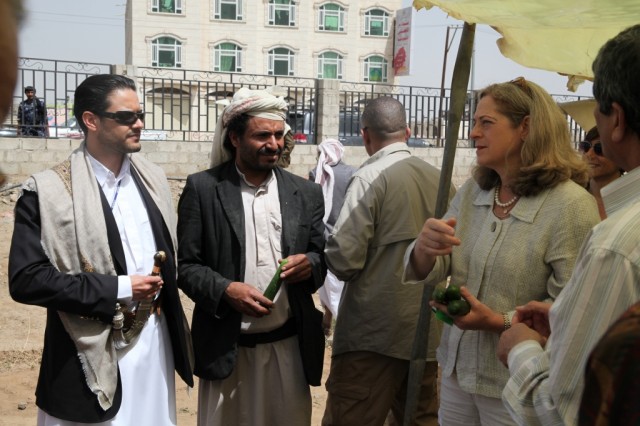
Improving yields with less water means more income
Khalib Al Humaidi is a sharecropper at the farm of the Sawan Agricultural Society in Yemen. For years, he planted potatoes, earning $50 (10,000 Yemeni Riyals) per harvest for his labor after splitting the profit with the Society.
Making ends meet was a struggle. “It was very complicated,” he said.
Nowadays, however, the father of three feels as if a great weight has been lifted off his shoulders. During the last harvest in late 2012, he made $1,500 (300,000 YER) from cucumbers after splitting the profits with the cooperative. He is now in the middle of another harvest and, so far, it looks like the yield will be 12 times that of a traditional field of a similar size of 374 square meters.
With the recent Ramadan season in July, prices of cucumbers went up, as expected, as the sunset Iftar feasts will never be complete without this crop.
So how did Al Humaidi’s circumstances change?
In mid-2012, Creative Associates International, through its Community Livelihoods Project, established a solar-powered greenhouse at the Sawan farm that, by using a humidity-regulating fan, uses 92 percent fewer pesticides than normally used in other greenhouses. Creative also installed a highly efficient drip irrigation system that conserves water irrigation use by 70 percent.
Creative recently constructed a rainwater-harvesting system at the farm, which will give it a fully sustainable water supply and ease the pressure on the already stressed groundwater supply.
The Sawan farm is one of three demonstration sites in Sana’a that have been showing farmers like Al Humaidi how green technologies can both boost production and conserve precious water resources. Creative will establish 11 more demonstration sites in 2013 that include five solar-powered greenhouses with drip irrigation for horticulture production.
“Green technologies is the way to go. I have gained a lot of knowledge and experience, like building a greenhouse, new techniques of planting inside the greenhouse, how to control humidity, and more importantly, ways to save water,” said Al Humaidi. “My family is now able to have a decent life and we can even save some money.”
This success story was recently featured on USAID’s Transforming Lives website.
Dorelyn Jose is based in Yemen as the Community Livelihoods Project Communications Officer.

